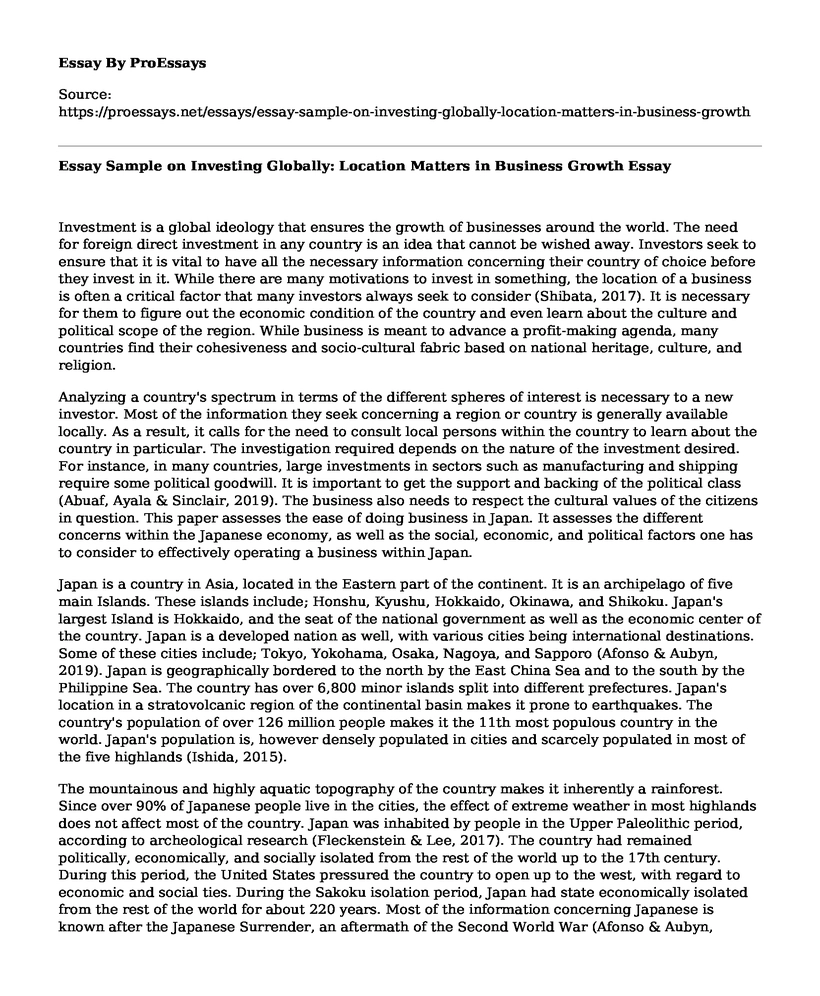Investment is a global ideology that ensures the growth of businesses around the world. The need for foreign direct investment in any country is an idea that cannot be wished away. Investors seek to ensure that it is vital to have all the necessary information concerning their country of choice before they invest in it. While there are many motivations to invest in something, the location of a business is often a critical factor that many investors always seek to consider (Shibata, 2017). It is necessary for them to figure out the economic condition of the country and even learn about the culture and political scope of the region. While business is meant to advance a profit-making agenda, many countries find their cohesiveness and socio-cultural fabric based on national heritage, culture, and religion.
Analyzing a country's spectrum in terms of the different spheres of interest is necessary to a new investor. Most of the information they seek concerning a region or country is generally available locally. As a result, it calls for the need to consult local persons within the country to learn about the country in particular. The investigation required depends on the nature of the investment desired. For instance, in many countries, large investments in sectors such as manufacturing and shipping require some political goodwill. It is important to get the support and backing of the political class (Abuaf, Ayala & Sinclair, 2019). The business also needs to respect the cultural values of the citizens in question. This paper assesses the ease of doing business in Japan. It assesses the different concerns within the Japanese economy, as well as the social, economic, and political factors one has to consider to effectively operating a business within Japan.
Japan is a country in Asia, located in the Eastern part of the continent. It is an archipelago of five main Islands. These islands include; Honshu, Kyushu, Hokkaido, Okinawa, and Shikoku. Japan's largest Island is Hokkaido, and the seat of the national government as well as the economic center of the country. Japan is a developed nation as well, with various cities being international destinations. Some of these cities include; Tokyo, Yokohama, Osaka, Nagoya, and Sapporo (Afonso & Aubyn, 2019). Japan is geographically bordered to the north by the East China Sea and to the south by the Philippine Sea. The country has over 6,800 minor islands split into different prefectures. Japan's location in a stratovolcanic region of the continental basin makes it prone to earthquakes. The country's population of over 126 million people makes it the 11th most populous country in the world. Japan's population is, however densely populated in cities and scarcely populated in most of the five highlands (Ishida, 2015).
The mountainous and highly aquatic topography of the country makes it inherently a rainforest. Since over 90% of Japanese people live in the cities, the effect of extreme weather in most highlands does not affect most of the country. Japan was inhabited by people in the Upper Paleolithic period, according to archeological research (Fleckenstein & Lee, 2017). The country had remained politically, economically, and socially isolated from the rest of the world up to the 17th century. During this period, the United States pressured the country to open up to the west, with regard to economic and social ties. During the Sakoku isolation period, Japan had state economically isolated from the rest of the world for about 220 years. Most of the information concerning Japanese is known after the Japanese Surrender, an aftermath of the Second World War (Afonso & Aubyn, 2019). The devastation of the atomic bombs in Hiroshima and Nagasaki marked a significant period in the country's economic history.
References
Afonso, A., & Aubyn, M. S. (2019). Economic growth, public, and private investment returns in 17 OECD economies. Portuguese Economic Journal, 18(1), 47-65.
Fleckenstein, T., & Lee, S. C. (2017). Democratization, post-industrialization, and East Asian welfare capitalism: the politics of welfare state reform in Japan, South Korea, and Taiwan. Journal of International and Comparative Social Policy, 33(1), 36-54.
Ishida, H. (2015). The effect of ICT development on economic growth and energy consumption in Japan. Telematics and Informatics, 32(1), 79-88.
Shibata, S. (2017, July). Re-packaging old policies? 'Abenomics' and the lack of an alternative growth model for Japan's political economy. In Japan forum (Vol. 29, No. 3, pp. 399-422). s
Cite this page
Essay Sample on Investing Globally: Location Matters in Business Growth. (2023, Mar 09). Retrieved from https://proessays.net/essays/essay-sample-on-investing-globally-location-matters-in-business-growth
If you are the original author of this essay and no longer wish to have it published on the ProEssays website, please click below to request its removal:
- Taxation Theory, Practice and Laws
- Appropriate Portfolio for the XYZ to Allocate Fund and Additional Resources
- Intercom Enterprise Auditing Paper Example
- Case for and Against Central Bank Independence - Paper Example
- Essay Sample on Managing State Finances: Creative Revenue Generation and Benefiting Citizens
- Essay Sample on Lower Interest Rates: How Expansionary Monetary Policy Stimulates Economy
- New Safety Deposit Box at Elmore Bank Welcomed by Groom-to-Be Jimmy - Essay Sample







